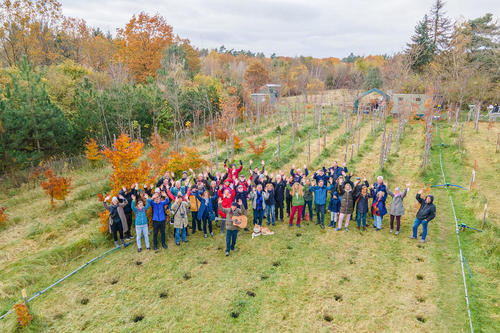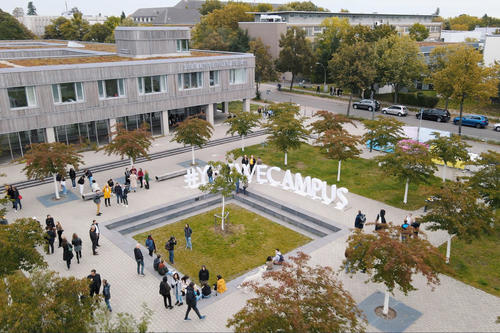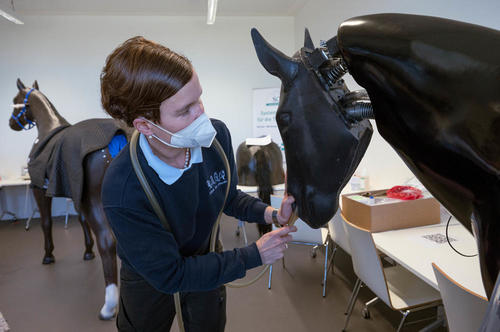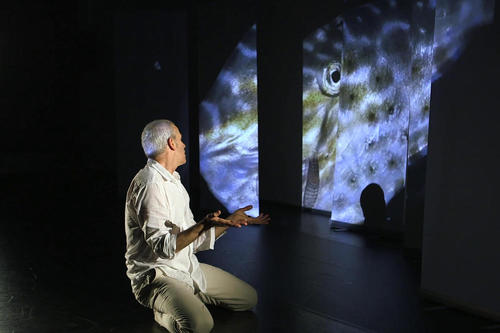Semester Highlights
A Song for the Climate Forest ++ Going Back to Normal – At Least for a Little While: #YesWeCampus ++ Learning by Example: Veterinary Medicine Students Simulate Emergency Situations ++ Main Stage: “Theater of the Anthropocene”
Jan 24, 2022
British singer-songwriter Robert Metcalf (with guitar) and a choir of volunteers in Berlin’s Grunewald taking a stand for the preservation of common beech forests among some 800 specimens.
Image Credit: Björn Kral
A Song for the Climate Forest
British singer-songwriter Robert Metcalf and a choir of volunteers met among some 800 common (or European) beech trees in Berlin’s Grunewald in early November to send a signal for the preservation of common beech forests, which are endangered by climate change. The common beech is Tree of the Year 2022. The beech trees were grown in the Berlin Botanical Garden, which belongs to Freie Universität, using seeds from all over Europe. In December 2019, the seeds were planted in the Grunewald. By means of the “climate forest” scientists and students of Freie Universität, led by Dr. Manfred Forstreuter, want to find out whether common beech trees can withstand the climate crisis better than their native relatives – regardless of whether they come from Sicily or southern Sweden, from Spain or Romania. The project is supported by Berliner Forsten (“Berlin Forests”) and the Waldmuseum (“Forest Museum”) run by Schutzgemeinschaft Deutscher Wald. Anyone who would like to support the climate forest with a tree sponsorship can contact the Ernst Reuter Society; each “tree adoption” is supported by an additional grant.
A video of the group singing (produced and sponsored by the Ernst Reuter Society) can be viewed on YouTube. The song is also available on Spotify and other streaming platforms.
Going Back to Normal – At Least for a Little While: #YesWeCampus
Under the hashtag #yeswecampus Freie Universität kicked off the 2021/2022 winter semester with a week full of events and activities.
Image Credit: Björn Kral
How many video chat frames would it take to cover the surface area of Freie Universität’s campus? How many would it take to represent all of the fields, topics, and projects that people at the university work on? How many would it take to show all of the people who study, teach, research, and work at our university? If you’ve already started to crunch the numbers, take a deep breath – we don’t have any exact figures. But one thing is for certain: The real-life campuses in Dahlem, Düppel, and Lankwitz (where Freie Universität Berlin is located) are by far more beautiful, more colorful, and more inspiring than the digital world in which we spent the last months teaching, researching, and working due to the pandemic. The week of events on campus from October 4 to 7, 2021, was a chance for new students and those who hadn’t experienced the university in person yet to come to campus and explore their surroundings.
Learning by Example: Veterinary Medicine Students Simulate Emergency Situations
The horse model helps students to understand how colic develops and how to treat it.
Image Credit: Bernd Wannenmacher
Dr. Ann Kristin Barton, associate professor and specialist veterinarian at the Equine Clinic, which falls under the Department of Veterinary Medicine at Freie Universität, carefully inserts a nasogastric tube through the esophagus and into the stomach of a horse model. She is showing veterinary medicine students how this technique can be used to check and, if necessary, aspirate the stomach contents of a horse. Practicing on animal models is now part of a required course, in which students learn to treat the most common emergencies in veterinary medicine. Typical emergencies include a dog getting hit by a car, a cow with a complicated delivery, a chicken with suspected salmonella, or a horse with colic. The Department of Veterinary Medicine at Freie Universität has around ninety animal models at hand to carry out these emergency simulations. The advantage of using these models is that medical interventions on healthy animals can be avoided. A special feature of the teaching concept is that all those who study veterinary medicine in Düppel in turn teach their fellow students on an animal model. The interactive teaching format was the brainchild of Dr. Jörg Aschenbach, Professor of Veterinary Physiology and Vice Dean for Teaching at the Department of Veterinary Medicine.
Main Stage: “Theater of the Anthropocene” and Einstein Research Unit “Climate and Water under Change” Present Salon on the Future of Water in Berlin-Brandenburg
Art and science come together at the “Theater of the Anthropocene.”
Image Credit: Theater des Anthropozän, Andreas Deinert
“What are we meant to do for these bodies of water?” dancer Ziv Frenkel seems to ask, his gaze turned to a fish swimming by on a screen in the Humboldt Forum’s Humboldt Lab. Frenkel is a member of the “Theater of the Anthropocene,” which together with the Einstein Research Unit “Climate and Water under Change (CliWaC)” brings science to the stage. In the context of the Research Unit, scientists from universities within the Berlin University Alliance are investigating how climate change will affect the availability and quality of water in the Berlin-Brandenburg region and how water resources can be managed sustainably.
“However, we not only want to describe the effects of climate change in scientific terms, but also understand what risks citizens perceive in relation to climate change and what ways out they see,” says Dr. Britta Tietjen, professor at the Institute of Biology at Freie Universität and spokesperson for the Research Unit. “Art is a terrific way of engaging in conversation with people,” says the ecologist, “because we can express our feelings, fears, and thoughts with and in art.”
Inspired by the Berlin salons of the eighteenth century, the idea is to create a space of congregation, artistic experiences, and knowledge. Visitors will participate in several mini-performances and engage in conversation with researchers about a sustainable future with regard to water. “I am very curious about how it will all unfold – the outcome is completely open,” says Dr. Tietjen.




